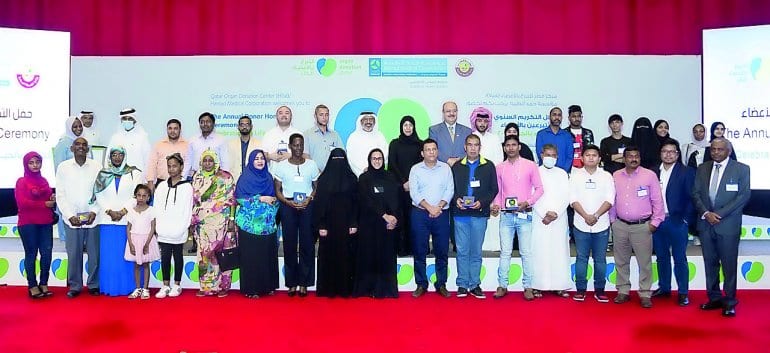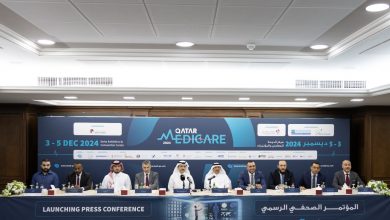
HMC hosts international meeting on organ donation and transplantation
مؤسسة حمد الطبية تعقد اجتماعا دوليا حول التبرع بالأعضاء وزراعتها
DOHA: International healthcare experts from eleven countries gathered in Doha this week to share their expertise on organ donation and the types of challenges they encounter working in this field.
The aim of the meeting was to provide an opportunity for the experts to learn from each other and develop plans for future professional collaboration. The meeting was also used as a platform to discuss ways to improve the global rate of organ donation and the development of organ transplantation programs.
Healthcare officials from the United States, Spain, India, Pakistan, Australia, South Africa, Croatia, the Philippines, Sudan, and Oman joined experts from Qatar for a series of high-level meetings and lectures under the umbrella of ‘Bridging Communities to Develop Organ Donation.’
Since the Qatar Organ Donor Registry was launched in 2012, around 300,000 donors, or 15 percent of the country’s adult population, have registered as organ donors. This year, there have been 45 transplants, including 35 kidney transplants (23 from living donors, and 12 from deceased donors), nine liver transplants (four from living donors and five from deceased), and three stem cell transplants – all from living donors. This is compared to a decade ago in 2008 when just two kidney transplants were performed.
The most recent data from the WHO Global Observatory on Donation and Transplantation (GODT) shows that more than 130,000 solid organ transplants are performed worldwide each year, and although impressive, it is estimated that this number represents less than ten percent of the global need.
The Minister of Public Health, H E Dr. Hanan Mohamed Al Kuwari, Minister of Public Health, said that Qatar’s organ donation program, with a unified national waiting list, has become a model for other countries to emulate.
“With fairness and equity at its heart, our program has been recognized internationally. Qatar’s national strategy for organ donation and transplantation is not only world-leading in terms of the clinical and ethical standards it applies but it is also one that is appropriate to the healthcare needs of our growing and diverse population,” said Dr. Al Kuwari.
“Like other countries, we face challenges in achieving self-sufficiency in organ donation. Self-sufficiency in organ donation can only be achieved through international cooperation and the support of countries seeking to develop and improve their own systems.”
Professor Riadh Abdul Sattar Fadhil, Director of the Qatar Organ Donation Centre (Hiba), said Qatar’s success and unique experience could be replicated in other countries that share the same socio-cultural perspectives.
“Qatar is a diverse and multicultural country and the success of our program is a direct result of the high-level of support we have received from our leaders such as Her Excellency Dr. Al Kuwari. Our organ donation program has seen remarkable success in the past few years and our annual organ donation campaign has managed to bring about a large shift in public understanding and perspective of this important topic,” said Professor Fadhil.
This week also saw a special ceremony to honor living donors as well as the families of deceased donors. Forty-four expats and Qataris were awarded the ‘Medal of Altruism’ for their selfless acts. Companies who support the organ donation program were also acknowledged.
عقدت مؤسسة حمد الطبية اجتماعا لعدد من الخبراء الدوليين في مجال الرعاية الصحية من 11 دولة لتبادل الخبرات في مجال التبرع بالأعضاء وزراعتها، ومناقشة التحديات التي يواجهونها على هذا الصعيد، كما أقامت المؤسسة احتفالاً خاصاً لتكريم المتبرعين الأحياء وأسر المتبرعين المتوفين.
ويهدف الاجتماع الذي جاء تحت شعار”مد الجسور بين المجتمعات لتعزيز التبرع بالأعضاء” إلى تبادل الخبرات ووضع خطط التعاون المهني في المستقبل، ومناقشة سبل التعاون لتحسين معدل التبرع بالأعضاء على الصعيد العالمي وتطوير برامج زراعتها.
وبهذه المناسبة ، أكدت سعادة الدكتورة حنان محمد الكواري، وزيرة الصحة العامة أن برنامج قطر للتبرع بالأعضاء، الذي يتضمن قائمة انتظار وطنية موحدة، يعد نموذجاً يحتذى به، خاصة وأن هذا البرنامج يراعي في جوهره العدل والإنصاف، ويحظى بالاعتراف الدولي.
وأضافت: “أن ما تضمّنته استراتيجية قطر الوطنية لزراعة الأعضاء من ثوابت جعلتها تتبوأ مركز الصدارة بين مثيلاتها في العالم سواء على صعيد المعايير الطبية والأخلاقية التي تطبقها أو على صعيد ملاءمتها لاحتياجات الرعاية الصحية لدولتنا المتنامية والتنوع الثقافي، فنحن نواجه على غرار كافة الدول الأخرى، الكثير من التحديات لتحقيق الاكتفاء الذاتي على مستوى التبرع بالأعضاء، غير أن هذا الاكتفاء لا يمكن أن يتحقق إلا من خلال التعاون الدولي ومساندة الدول التي تسعى إلى تحسين وتطوير أنظمتها”.
من جانبه، أكد البروفسور رياض عبد الستار فاضل، مدير مركز قطر للتبرع بالأعضاء (هبة) على أنه بإمكان الدول الأخرى التي تتبنى وجهات النظر الاجتماعية والثقافية نفسها تطبيق تجربة قطر الناجحة والفريدة، خاصة وأن دولة قطر تتميز بتنوعها وتعدد ثقافاتها.
وأضاف أن برنامج التبرع بالأعضاء حقق نجاحاً بارزاً بفضل دعم وزارة الصحة العامة والحملات السنوية للتبرع بالأعضاء، التي أدت إلى تحول كبير في فهم الجمهور ونظرته لهذه المسألة الهامة، ما أدى إلى تغيرات ملموسة على مستوى موقف الجمهور من التبرع بالأعضاء، ومن ثم ارتفاع عدد الأشخاص المسجلين للتبرع بالأعضاء وزيادة عدد المتبرعين الأحياء.
يذكر أن عدد المتبرعين المسجلين في برنامج قطر للتبرع بالأعضاء منذ تأسيسه في العام 2012 ، نحو 300 ألف متبرع، ما يفيد أن 15 بالمائة من عدد السكان الراشدين في قطر قد وقعوا على استمارة التبرع بالأعضاء.
وشهد هذا العام 45 عملية لزراعة الأعضاء منها 35 عملية زراعة كلى (23 منها من متبرعين أحياء و12 من متبرعين متوفين)، وتسع عمليات زراعة كبد ( 4 منها من متبرعين أحياء و5 من متبرعين متوفين) فضلاً عن 3 عمليات زراعة نخاع العظم، كلها من متبرعين أحياء، وذلك مقارنة بالسنوات العشر الماضية التي لم يتجاوز خلالها عدد عمليات زراعة الكلى في العام 2008 عمليتين فقط.
وأظهرت البيانات الأخيرة الصادرة عن المرصد العالمي للتبرع بالأعضاء وزراعتها التابع لمنظمة الصحة العالمية أن عدد عمليات زراعة الأعضاء التي يشهدها العالم سنوياً تجاوز 130ألف عملية، وفي حين أن هذا العدد يستحق الذكر، تشير التقديرات إلى أنه يمثل أقل من 10بالمائة من الاحتياجات على الصعيد العالمي.



